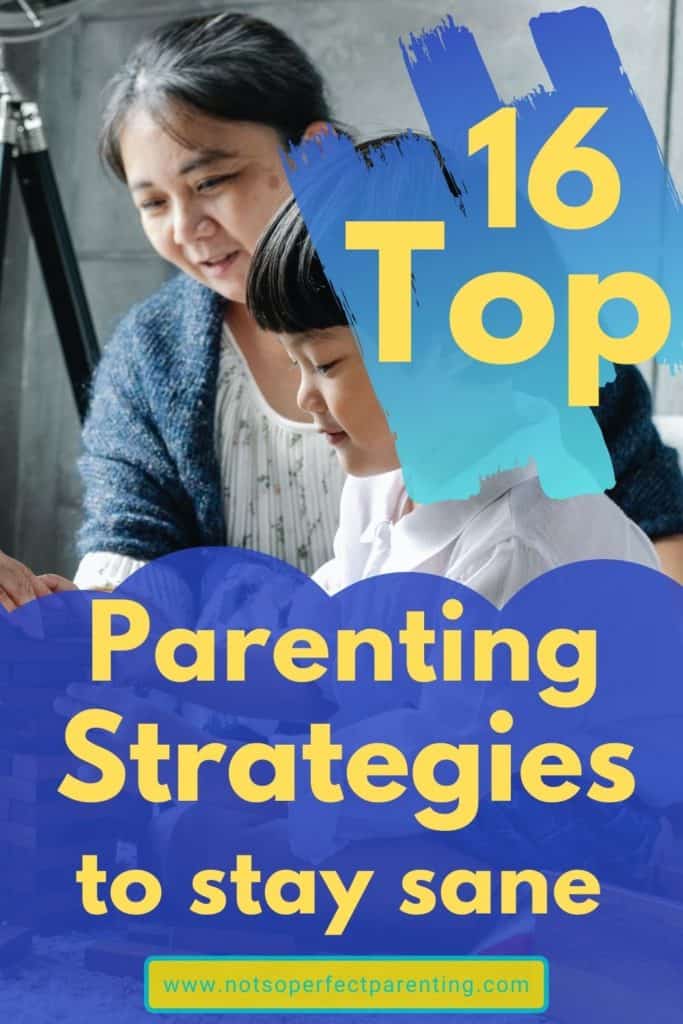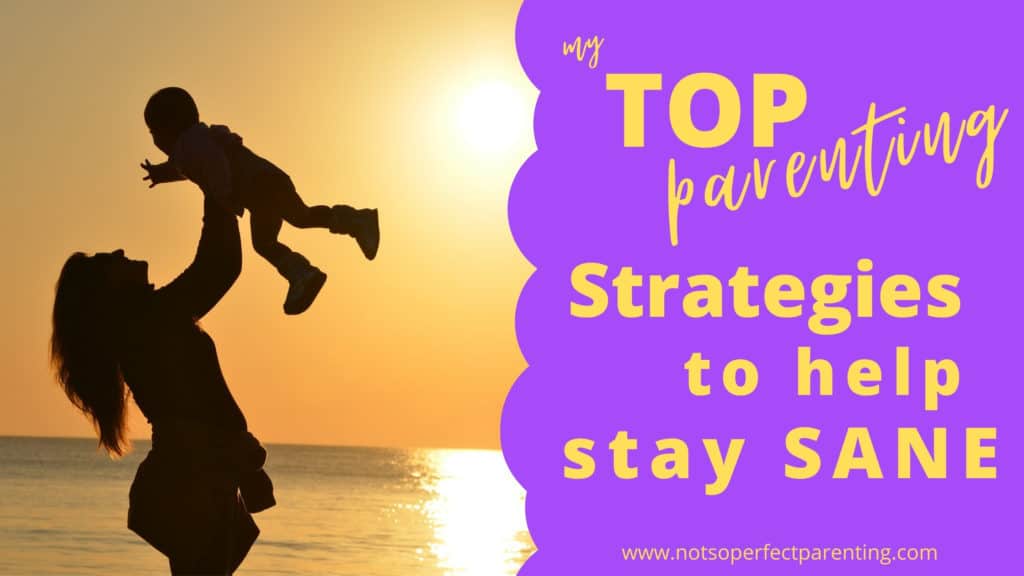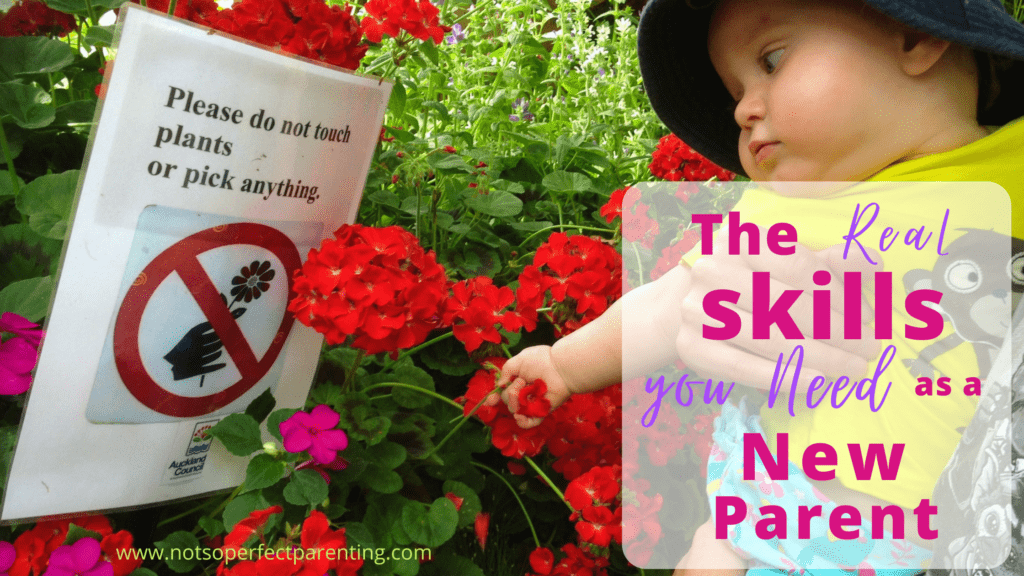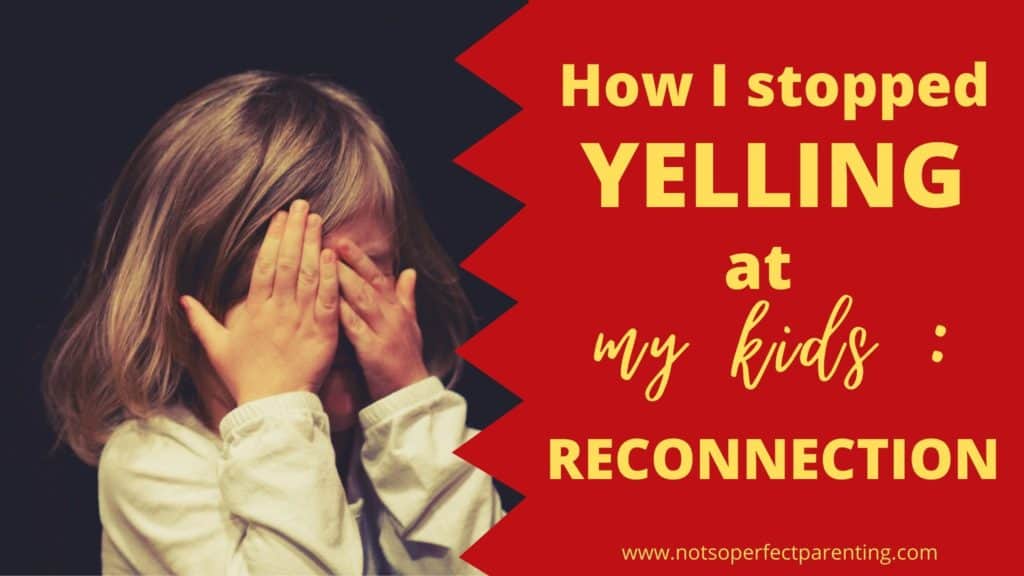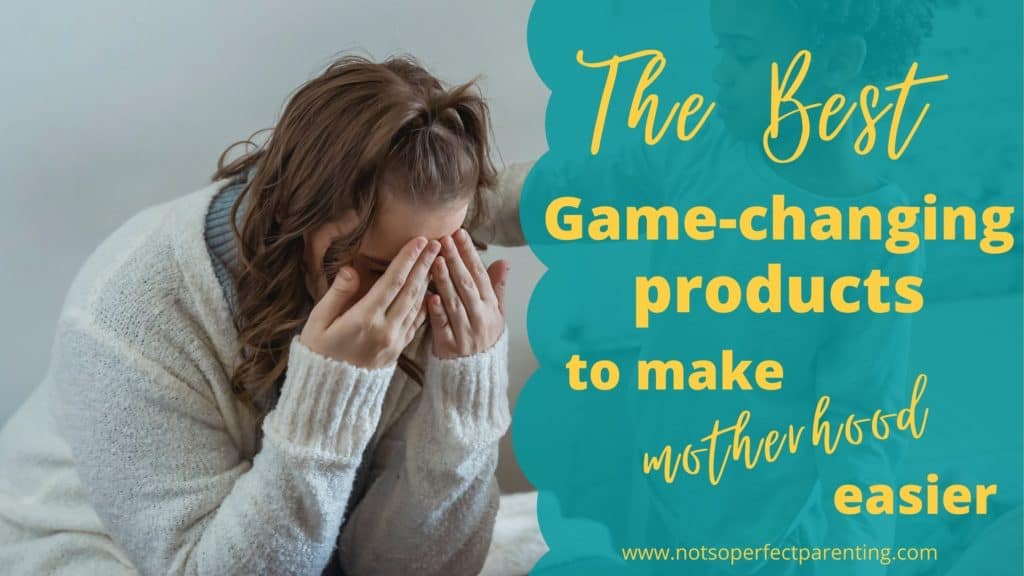My Best Parenting Strategies to keep me sane
This post gathers together my best parenting strategies to keep me sane. These strategies have been developed over the nearly eight years I’ve been a parent to my two little humans. I’m putting them in one place to remind myself of these sanity tips whenever I feel lost. I’ll no doubt be updating it as time goes by. I’m hoping that some of my ideas help you too.
My reasoning for this is because a while back, I was in a bad headspace. Stressed out ALL the time and I told myself there was no time to figure it better parenting strategies.
I was juggling so much; a part-time job, school and daycare pick-ups, groceries, meals, bedtime, laundry, next-day prep. I remember sitting in the bathroom sobbing, tracking my husband to see if he had left work yet. This hamster wheel of stress often led to me yelling at my two daughters. Desperately, I would emotionally blackmail them, and just being a mean mother.
I had to develop tools for how to parent better.
It’s not great to admit it here for all the world to see, but it’s the truth. And we can’t improve anything if we don’t have the guts to face up to ourselves, right?
Our brains seem to be so good at steering us away from being uncomfortable. There is a multitude of distractions to keep us from focusing on personally growth. But we have the power to make this space, even in bite-size moments. In fact, you probably already have your own parenting strategies to stay sane. Maybe they just need at refresh.
Disclaimer; I’m not a doctor or medical professional. The words in this post are only my thoughts and opinions and if you choose to act on any suggestions those are your own decisions and responsibility.
Where do I start with being a better parent?
Before we get into any parenting strategies that keep us sane, let’s take a step back and look at our foundations.
None of us would be here if it wasn’t for our parents, right? They gave us life, but they also gave us their parenting style. Whether that was a good or bad influence in our lives, it has shaped who we are as adults. So it’s a big responsibility, probably the biggest many of us will deal with in our lives.
There isn’t guide book, or a test you need to pass before you’re allowed to be a parent. So mostly we’re winging it.
However, parenting is a skill. And a skill that can be improved on. When I realised this, I took a load of pressure off myself. I wasn’t supposed to have all the answers. And it meant I could keep an open mindset and be gentler on myself when things weren’t working.
Lastly, before we dive in further, let’s not forget: YOU are the expert on your own personal little human.
Reflect back on how you were parented
This isn’t a judgement on your parents’ choices. We’re all human, and we’re all just trying to do our best with what we have available.
There are always factors out of our control such as the influence of where we live or our financial situation. But, we do have greater control over our parenting choices, and how that affects the relationship with our little ones.
I want to understand what’s influencing my parenting decisions and what I am consciously passing on to my children. This means I need to work on some deeper questions about my own childhood.
Some questions to help with your reflections:
- Were you praised often?
- Did fear of punishment or failure motivate you, or were you motivated by positive outcomes?
- Do you remember your parents playing with you or were you encouraged mostly to play by yourself or with siblings?
- What were positive / negative influences from your parents?
- Write down some happy / unhappy memories with your parents when growing up? Can you see connections to how you parent?
- Do you copy some of your parents’ methods or actively reject them?
- What parenting style do your parents fit? Authoritarian / Authoritative / Permissive / Uninvolved? How do you compare?
- What did discipline look like? What did consequences look like for you? Were they physical? Verbal? Punitive? Restorative?
- How did your parents make you feel? What messages did you pick up from them regarding intelligence, value, risk-taking, and ability?
It was really helpful for me to look back on how I was parented. I realized that some of the ways I parent my daughters imitate my experience as a child. And I hadn’t been conscious of this.
This eases the pressure I put on myself. It means I can change if something isn’t working and that it’s not a fundamental flaw in me. My parents may have been disciplined in the same way by their parents, without realising. I have the power to work on myself to bring what might be learned behaviour and unconscious, into the conscious.
Defining parenting goals as a couple
When our first daughter was charging into her second year of life, it became clear; She was discovering PERSONALITY. Tantrums were starting to tarnish the soft playful snuggles of babyhood and there was a slight issue with biting. As parents, we had to get on the same page.
Just saying “No!” had little effect. We had to dig deeper and ask ourselves questions about how we wanted to deal with unwanted behaviour. Then even deeper to ask what effect our chosen strategies might have on our child. We were most effective when we were on the same page and supported each other.
It helped to ask ourselves ‘what kind of parents do we want to be?‘ Our joint focus was along the lines of Firm, Calm, Listening, Fun, Loving, Educational.
Questions to help you get on the same page as parents:
- What kind of a parent do I want to be?
- What do I need to teach my child in order for them to lead a fulfilling, happy and meaningful life?
- How are you going to support your partner when dealing with difficult parenting moments?
- What behaviour do I want to model to them?
- How will you talk to each other when you disagree with each other in front of the children? (this could be a good opportunity to model conflict resolution)
Being on the same page with your parenting partner consistently means you both acknowledge that it’s hard. And at times a battlefield. It also keeps you tuned in to each other if one of you is not coping.
Shifting my mindset: Parenting is relationship building
It’s common for people to think of parenting as a job, or a role we have in life. It is after-all time consuming.
What happens when we shift this perception towards parenting being about growing a healthy relationship with children? Relationships need to be constantly worked on. The participants are always growing, changing, and learning. So there’s room for it to get messy – you’re not going to always get it right.
I like to think of it as an opportunity for myself and my children to learn about forgiveness.
This doesn’t mean that I’m trying to damage my children and make myself feel okay about it. My core aim is to raise resilient, happy, kind, and brave people. However, in order to achieve this daunting goal I have to give myself some leeway and room to grow myself.
We’re the first relationship our children form in life. Through this relationship they learn about the world and how to react to the world. It’s heavy stuff to contemplate, I know. My strategies help me be a better parent and grow awareness of myself, my children, and my quality of life.
I’m all for my children learning that good relationships are about a good quality of life.
My strategy list for calmer parenting :
1. Constantly update my No Yell Strategy
I’ve accepted that not yelling at my kids will be an on-going battle and requires work. Knowing myself is a good place to start – I’m an easy yeller and my blood boils quick. I caught myself yelling at them in the bathroom yesterday “stop yelling at me!” What a hypocrite.
There’s an Everest-sized mountain of data about why yelling at kids is damaging to their developing brains, future mental health, and your relationship with them. So minimizing yelling is an important objective. I also see raising my voice as the fastest gateway to losing control of the situation.
Even though I know all this, I really struggle with yelling as a default setting. That’s why I change up my No Yell Strategy quite often.
My latest one is to lessen yelling from another room, even if it’s just to ask a simple question. If it’s possible to walk to the same room and calmly talk to my children, then do it. It helps me establish that the normal way to talk to each other is calmly and respectfully.
Another strategy that worked for a while was; starting each day (when I have 5 minutes to myself) to reaffirm my commitment to React Calmly, no matter what the situation.
I listen to Mel Robbins quite often and find her 5 Second Rule really helpful. The more I use it, the more it becomes second nature. If I find myself yelling, I have to stop, close my eyes and count backwards from 5. Obviously, if you’re driving, keep your eyes open!
When things were really bad and I needed a strong reminder to not yell, I came across is the simple and effective Hair Tie Trick by Kelly Holmes. This is great because it gives me a visual reminder of 5 bracelets, 5 chances to not yell at my girls. The goal is to have all 5 bracelets on my starting wrist at the end of the day. If I yell, I have to put one of the bracelets on my other wrist. I can earn it back by working on 5 moments of connection. It was surprising how much more aware of myself I was.
I let the girls in on it too because I wanted them to know that I was working to be calmer. I wanted to show them that I can change my pattern of behaviour. They were very supportive.
2. Store distractions up my sleeve
You know overwhelm; concentrating on cutting out the perfect circle, while making dinner, while fielding a thousand questions a minute:
Where’s my favourite toy?
Where’s my water bottle?
Why does it hurt when you poke yourself in the eye?
Not to mention you haven’t gone to the bathroom for 6 hours. Before we know it we’re short circuiting. And we’re supposed to be the adults.
I have to remind myself quite often that if I find overwhelm hard to deal with, how are their young minds going to deal with it? Sitting down my 7.5-year-old to discuss why she randomly punched her sister isn’t going to always be effective. She feels overwhelmed and nothing I say will go in.
Sometimes the best way to shift her out of whatever prompted that moment of random meanness is a simple distraction to shift her focus, change the subject, get her brain into another circuit. I can talk to her about the hitting when she’s in a calmer, more reflective mood.
So, as we get ready for the day, I’ve mentally trained myself to collect up potential distractions that would help in such moments. Maybe I’ll discover a long-lost, beloved toy under the bed, or a little job that I think she might like – spraying and cleaning the windows. I try to notice two or three, in case the first tantalising distraction doesn’t work.
I’ve also learnt with my impulsive daughter that she’s not great at moments of transition. This tends to be when the disruptive behaviour grips her. It’s like a sudden and huge surge of energy courses through her and she doesn’t know what to do with it.
At the moment it’s a swift pinch or punch on her quietly occupied younger sister. Then she hides, waiting for the consequence, probably feeling the thrill of being naughty.
In the past I’d fall into making threats; toys will be taken away, there will be no pudding. But once I set up that battleground, it seems to wind her up more.
So I’ve changed my mindset – that in these moments, maybe she’s not trying to be hurtful or mean. I know how much she adores her sister. Quite often she says to me in defence of her actions “It was an accident!” Maybe what she means is that she didn’t mean to do that.
I’m trying to use less punitive or harsh words on her. I’m finding it quite helpful for both of us to say to her:
You seem to be trying to tell me you need something. Is there another way you can get my attention, instead of hurting your sister?
Before becoming a mum, I thought I would sound firmer as a parent. I’m not a fan of molly-coddling kids. And yet, I can see how prompting these suggestions to children might seem like wrapping them up in soft cotton wool. I’ve certainly been judged by non-parent friends as doing that.
However, my point is this: I know my kids. And I’ve seen them cope and behave kinder when I parent in a supportive way.
3. Model behaviour by putting my phone down
In the last few years I’ve noticed my ability to focus for long periods of time lessening. I blame my use of my mobile phone. The reward of a fast dopamine hit in the brain from checking out some new information is always at my fingertips.
This is eating away at my resilience to push through boredom with a task or hard work. What will it be like for our kids if they never learn in their ultra absorbent state how to focus for longer than 5 minutes.

The growing domination of technology over our lives is still in the early stages too. I’m in my 40s and am well aware that I’m part of the last generation that will understand what it was like to live / function before the internet.
I even remember in my teens making plans on a landline phone with friends to meet on a certain day at a certain time. There was no way of texting en route to let them know you were running late.
There is no doubt that technology is great and improves our lives vastly. However, I think a need to nurture an awareness and develop ethics alongside its use will grow greater too. I don’t want that domination of technology over their young lives to be the norm or for them to feel like that’s the only way to function.
I’ve started to model for my kids an awareness of phone use and the reason for use. When my girls are around both my husband and I are quite intentional about putting our phones down now.
If we use our phones in front of them we always declare what the use is for, such as “I’m looking up a recipe for cheese rolls or play doh”
It keeps them aware that the phone is a tool with many uses. It also keeps us accountable to them about what we’re doing. And this grows our awareness as well as theirs when and how much we are using our phones, and battling mindless scrolling.
4. Show them failure, apology, and learning
Although we don’t like to admit it, failure happens to all of us. We’re human. It’s part of the game. So at some point knowing how to cope with Not being good at something, or picking yourself up again after disappointing results is going to be incredibly valuable in a young life.
Real strength lies in finding a way to keep going. Not in achieving every goal.
The easiest way for me to show this to my children is to voice how I feel or reframe my attitude. An example that happens quite often for me is when I go for auditions “Oh, I didn’t get that job. I feel sad about that, even though I know I did my best. Maybe I wasn’t right for it this time, but there’ll be new opportunities and roles to try for.”
I think what’s most confronting for me as a parent is admitting to my kids that I don’t have control over a lot of things. It’s scary to tell them that we don’t know what’s going to happen in the future. And it’s scary for them to hear it. There is a lot in our world right now that is daunting and despairing when we look into the future.
So what’s an empowering position to take? I think it’s, first of all, admitting how scary that is, and then finding a way through. Even when small, everyday things go wrong, like forgetting a particular item on the shopping list, or letting someone down and wholeheartedly apologising, even if it was out of your control.
Having the attitude that you’ll stay open and do better next time. The truth of being human is accepting that we don’t know the future, we are totally flawed, but we can commit to never giving up and striving to be better. It’s a scary and vulnerable state to be in, but it’s the truth.
5. Nature is your friend
Part of my husband’s work is managing events for his organisation and he has to work late. There are some times of year we don’t see him in the evenings for week long stretches. This disruption to routines tends to send us all round the bend.
One week, nothing I did seemed to be working. In a moment of desperation I stepped outside to breathe. Suddenly I felt my shoulders relax, my feet sink into the grass.
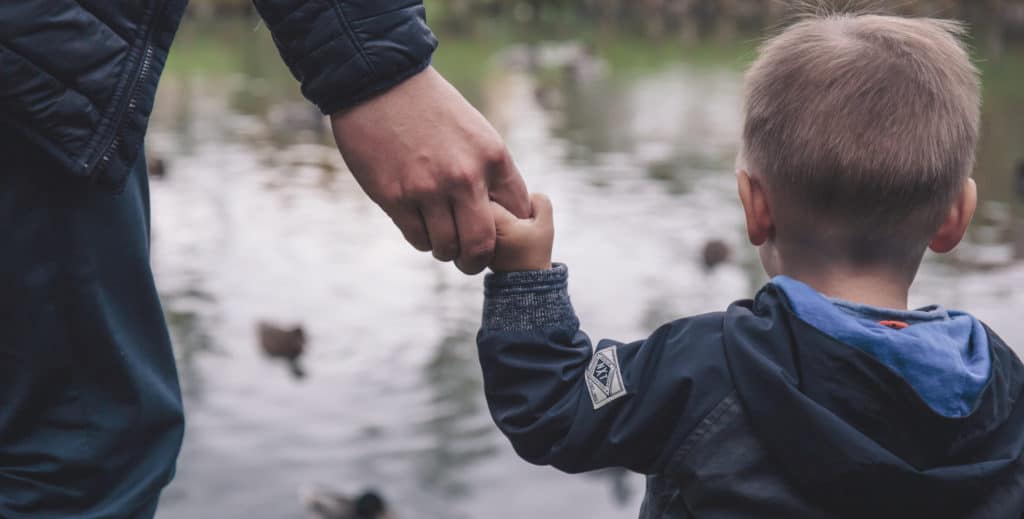
Of course, OUTSIDE. The weather wasn’t bad, why weren’t we outside?
Quickly I found two toy purse bags, shoved some shoes on little feet, and announced we were going on a scavenge hunt.
The excitement about what we’d find on a scavenge hunt was palpable. The six-year-old shifted instantly. It took us just five minutes to prepare for the outing. Would she need a scarf? What about snacks. But the sudden focus was magic.
Following on from that it took us an hour and a half to walk down our short road and back. Stopping to collect every daisy or fallen leaf. The girls were even helpful finding flowers for each other when they found a particularly “bootiful” one.
The next three evenings we went “scavenging” and the calmness was bliss.
Related post: The benefits of tree climbing for kids
6. Reward good behaviour
A simple parenting strategy that keeps us sane is to reward the behavior you want to see more of. I really only understood once I saw it in action with my own children.
Some people call it bribery or turning your children into snowflakes, but I prefer to see it as rewarding good behaviour that I want to see more of. It shows the children that behaving this way gets them positive attention and it fills them up.
Putting the attention on the positive behavior also means you have to actively notice it more. When my daughters are playing calmly and I find I have 5 minutes to get some water and make a sandwich, it’s easy to forget that this is what I want to see more of. So I need to prompt myself to praise them for this specific behavior before I pour that glass of water!
This can also be used as an incentive once you’ve established a good amount of attention for positive behaviour. The timing of the reward has to be after the desired behaviour. I’ve slipped up on this in pure desperation to shift the floor whinging. Then I’ve got no lever to actually get them in the car.
The specific framing of what you want to see is important. Rather than just emphasising the physical result, also name the behaviour and intention you’d like the child to show. Instead of saying “If you get in the car, I can reward you with a story CD.” how about trying “If you calmly get in the car, then you can choose the first story CD for the journey home”.
7. Create an attention void for unwanted behaviour
The flip side of giving attention to the behaviour you DO want to see, is starving the behaviour you DON’T want to see. Attention is attention to children. I’m sure they would prefer happy warm cuddly attention, but if all they are getting is negative attention, they’ll take it over being ignored.
We’re wired that way. We’re also wired to react to danger and emergency and loud noises, which is why I find this one so much harder to do in reality.
When my eldest was six, she tended to be an impulsive hitter. before that biting. And in the past this has got her a lot of attention. Whenever she is overwhelmed or too excited, all the extra energy she doesn’t know what to do with surges through her and comes out as a sudden hit of her little sister as she runs by.
It’s so easy to pour all the negative attention onto the child who is misbehaving. What about the child who got hit, or isn’t retaliating?
And don’t forget about consistency. I usaully do. And I pay for it big time. Even one slip up lets them know that there’s a chance that a tantrum can get them attention, sometimes.
8. Sleep and bedtime routines
No doubt this is a mountain for all parents. Yes, even the ones that say “Oh but our little one is such a good sleeper”. There will come a time.

And these few paragraphs in this post may not shed much light on your situation. All I can say is that you are not alone, and don’t give up hope.
It might be that we never stopped trying to find a solution to get them to sleep all the way through the night, or it might have nothing whatsoever to do with our efforts and it was just time for them to sleep through. Please understand that my intention here is in not to sound like I know what you need to do.
We’ve slogged our way through the smorgasbord of settling techniques and sleeping arrangements. We were starting to think that we were destined to function as sub-optimally sleep-deprived adults for at least another decade. I’ve had co-workers with grown and not-grown children offer unsolicited and unhelpful advice, so that is not what I’m about to do.
I’ll probably jinx myself by writing this, but I feel like we’re arriving down the other side of No-Sleep mountain. My two girls who are three and six now go to bed between 7pm and 8pm, and sleep (most nights) all the way through until after 6am. If they do wake up we snuggle for a few minutes in their bed then return to our beds.
Only you will know what works best for your kids, and I’m a strong supporter of you listening to those instincts.
Some of the sleep “techniques” and tips that we’ve tried….
The over-popular and well publicised technique called Crying It Out (C.I.O.) or Ferber backfired when we did some re-training with our youngest at 2 years old. It made her more anxious and a worse sleeper. Before you say “oh you didn’t do it long enough,” we persevered for 8 weeks and would let her cry and howl for up to an hour each bedtime. It got so bad that she was too terrified by what her bedroom signified that she wouldn’t go in there during the day.
The reason we tried C.I.O. for so long was that it had worked when she was just 9 months old after just a few nights. She would settle by herself and resettle through the night, apart from one feed. It stayed that way until she got a cold and needed cuddles again.
The Cry It Out technique gets a lot of attention and is widely recommended to new parents. I got similar results that were far more supportive and less traumatic for my child by developing my own version of the Gradual Withdrawal technique.
My version was to stay in the room and not engage and be as boring as I could. I gradually positioned myself closer and closer to the door each night. This took a few weeks, but my child felt calmer and more supported at bedtime. Because she knew she wasn’t alone.
Another key that I find seems to helps is staying consistent. It’s like a ritual signalling for your child’s brain. Have a few steps in your bedtime routine like bath or shower, read a couple of books and snuggle, sing a song and say the same night night phrase as much as possible.
What finally worked to get our kids to through the night.
I don’t suggest anyone try what finally worked for us. But it was a reward of CHOCOLATE in the morning if they slept through. We were in a diabolical state. Both girls would take turns through the night waking 2 or 3 times and wouldn’t let us leave their beds. We were zombies and frazzled wrecks, unable to cope, so we were willing to try anything.
In desperation and because it was post-Halloween, I had a pile of chocolate gold coins left over. I told them that if they slept through they would get one in the morning. If they really really needed a cuddle we would come to cuddle them for 3 minutes, then we’d go back to bed. But that we’d only be able to come one time during the night.
They learned pretty fast when one of them would sleep through and the other one missed out. Sure, there were great wails and sobs as the sleeper sat munching on chocolate in front of the non-sleeper, but we reminded them that there was another opportunity to earn one the next morning.
After missing out a couple times, it started to work. Of course we knew it wasn’t sustainable, but I wanted to do it until it was ingrained in them.
It was the first thing they would ask in a sleepy voice when opening their bedroom door at 6am. “Do I get my sleep-chocolate?”
We’ve stopped handing out the choc first thing. But it’s definitely the norm for them to sleep right through now. Although it slips now and then. Of course now we’ve got no leverage.
9. Transition activities to help with sanity
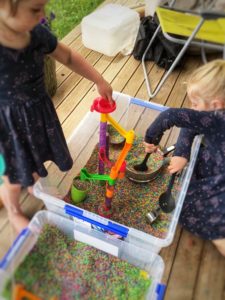
I’ve certainly noticed that transitioning between activities is tough for my kids. This tends to be the problem zone for unwanted behaviour.
I have a lot of learning to do in this area with my girls, but I find that having some activities in my back pocket that I can quickly set up or distract them towards is really the best way to make any transition smoother.
The more tactile the activity the better. Play-dough. Rainbow Rice. Water play. Painting. Slime. My dream is to have it all organised on a shelf that they can go and choose what to do.
A word of warning though; since I’ve been setting these activities up, I’ve noticed myself getting attached to the idea that this is what they will do when TV time finishes, or they come home from school.
And when they don’t feel like it, I feel frustrated.
So I’ve adjusted my mindset to setting these up. These transition activities are possible offers and invitations for them. That way there is space for them to engage, and if it’s not taken up, I don’t have to battle my own expectation monsters.
Coping with change is a life skill that needs time and support to grow. There are similar mental and emotional steps in the journey whether it’s a big transition, like moving house, or a daily one like putting toys away and washing hands for dinner.
Related post: 7 secrets of baking with kids
10. Visual schedules and routines
There’s so much that our little ones can’t control in this world. That can be a daunting feeling. If I let myself contemplate how little I can control in my life, well, that’s a fast track to despair.
So what do we do as adults to cultivate hope and convince ourselves it’s not too bad? No, I’m not talking about pouring a tall glass once their peepers are shut. We make plans, set goals, make action lists and verbalise our hopes and dreams.
I’ve found making a daily and weekly schedule board for the girls so helpful in getting them in a positive mindset. Especially if they can tick something off or get to put the sticker on themselves.
Especially my oldest. I see the glimmer of my grown up girl in there and my eyes get all itchy.
** Update: We are currently rewarding any good behaviour by adding 2 minutes to their Reading Eggs chart, that they get to do in the weekend.
11. Prioritise parent mental health
I feel like this one is the easiest to forget, but could be the magic to it all. Sure, it sounds selfish and like you’re neglecting your children’s needs over yours, but honestly, how are you helping your kid if you’re not doing so well?

If you’re feeling stressed, angry at the everything and overwhelmed, that’s going to have a massive impact on how you parent, and the messages you pass onto your children. It’s also difficult to be present and loving to other humans if you’re not centred in yourself.
Making time for your needs, desires and goals is important. You are a person too, and becoming a parent shouldn’t mean that growth in your life completely stops while you facilitate the growing of little lives.
I think it’s also important to model and inform them that Mum or Dad having some time to do their stuff is valuable. It makes them aware of our needs too.
Related post: How to fit in self-care for busy mums
I bet that when my girls are teenagers and want to spend all their time with their friends, I’ll be at a loss if I don’t keep focus on my own life goals. I don’t want to resent them for no longer wanting to spend time with me.
12. Build their confidence with specific praise
How much is too much praise? I know we’re worried about turning our children into little princes and princesses, or delicate snowflakes. But that’s not the kind of praise I’m talking about.
I’m talking about specific praise of their behaviour that grows in them an awareness of themselves. Such as “I really liked how you tried to stay calm when your brother took your favourite toy”. Even if your child does end up shouting or reacting physically there will have been a moment when they tried to not hit back.
It also shows them you’re on their side, you see what they are trying to achieve. It increases their vocabulary of their emotions. Being able to explain what they are feeling, will make them better communicators. This all leads to more confidence.
13. Household chores for mental peace
The juggle of parenting, especially in the years when they just seem to be mess monsters, can be so overwhelming. It makes holding down a job and appearing to be a calm and functioning adult, that much harder.

Trying to keep a tidy spotless home can steal so much joy from you and your children. However, I don’t feel joy being stuck between the mountain of clean, yet-to-be-folded laundry and the mountain of yet-to-be-washed laundry, either! So it’s about balance.
There are times when I just need to feel like I have control over the state of the house, and it won’t take me 5 minutes to find a spoon.
There are plenty of amazing you-tubers and bloggers out there sharing their wisdom on their best 11 hacks for doing laundry super-fast and keeping everything Kondo’d. But this just gives me anxiety about how imperfect I am.
Neither do I want to be a slob or teach my children that mess and chaos is how best to function. I’m much happier in the middle ground – it’s not perfect, but I can function.
It takes ages to teach kids chores, but slowly slowly they’ll get it, with constant reinforcement. 2020 for me is going to be more about making them responsible for their stuff rather than my picking it up after they’ve gone to bed. Watch this space for a report back on how I go!
14. Short sentences and processing time
It’s an overwhelming world. I’ve gone on and on about it in this post already. So it’s no wonder that our kids don’t hear what we’re saying – they’re in full processing mode most of the time.
I have to laugh at my self importance when the conversations go like this:
“Remember to put your sunblock on, and please, please if you aren’t going to wear your shoes then put them in your bag. They cost money and we can’t afford for you to lose them and….”
“Mum, who invented clouds?”
When I slow down, tune into my kids and take the world at their pace, it actually helps me not get overwhelmed. It’s a little window into their worldview and that’s a wonderful perspective.
Of course, when it matters, I check if my eldest has computed what I’ve said by repeating it back to me. Bit by bit. I don’t know if any of it stays in there, but at least I feel like I’ve been heard for just a small moment in time.
15. Avoid power battles and help channel their emotions
When my eldest was six she felt the pain of not being in the driving seat. We often say she’s never cared for rules much, and when she started school that was the biggest complaint – ” There’s too many rules. School’s boring!”
When I tell other mothers this, they immediately comment that she must be a natural leader. I like this, but I think there’s a few other parts to being a leader that might need nurturing.
I try to fill up her power bucket, to help her feel an adequate amount of control and autonamy by giving her more choice. If I don’t do this it just feels like a series of power struggles, one after the other.
Recognizing and avoiding the power struggle is the key. As soon as my power struggle alarm goes off in my head, I’m trying to stop getting pulled into the verbal dispute of who should pick up the colouring pens, or whatever it is. Instead, I’m reminding myself to REFLECT back to her what her behaviour is that I’m seeing:
” I can see you’re feeling really upset and frustrated.”
No qualifying or attaching to what the emotion is. Just the emotion. I feel like I’m building their emotional vocabulary and recognition.
It’s as if it gives us both a moment to breathe. There’s no fixing or problem-solving at that moment. Just sitting with the emotion. We all need to be seen. Deeply seen. And kids more than any of us need to feel that deep connection.
I think in the rush of modern life and forgetting to just be, do nothing now and then, we forget to just sit and connect.
16. Wrestling my own expectation monsters
We all know how our mood can affect the mood of our little ones, right? It’s like the umbilical cord is still there, they feed off us symbiotically and are learning about the world through the lens of us.
This is why keeping myself calm, un-frazzled, and going with the flow can be key to keeping my kids happy, friendly, and all the lovely moods we dream about.
Problem is, I’m my own worst enemy; I usually overload my to-do list, or the activity I have planned is unrealistic but I equate it with a normal family activity. I call them my Expectation Monsters.
And these guys regularly turn up and getting in the way of me seeing my girls and what they need. It’s one of the fastest triggers to wind me up and turn into the yelly-stressed mother I talked about at the top of this post.
As my oldest regularly posits to me, when I can’t get them into the car to get to the supermarket:
“What’s more important? Happy kids, or getting shopping?”
And it’s a good question. Sometimes. Another reason I keep my freezer stocked really well.
Tips for Success with your own parenting strategies
- Reflect back each day on what went well with your kids and anything that worked particularly well.
- Write it down and stick it somewhere visible.
- Remember you’re only human, you’re allowed to make mistakes, but you’re also allowed to try to do better next time.
- Talk to other parents for new inspiration and support – it’s okay to reach out for help.
Share your best parenting tips and feature on this blog
If you have some awesome parenting strategies that you’d like to share and feature on this blog click the button below to submit.
Final Thoughts on Parenting Strategies to stay sane
I’m definitely not an expert on parenting or kids and don’t claim to be. I have kids. And I want to be an awesome parent. As I’m sure you do, otherwise you wouldn’t be here reading this. What I’ve gained out of writing about my own parenting strategies to stay sane is three things:
- The realisation that actually, the nearly eight years I’ve been doing this parenting thing has taught me a lot. Both about myself, my kids, and humans. I am kinder, more forgiving, and curious about the world since having children.
- Having a plan or list of techniques, whether I use it or not, tunes me into what I think is most important for my children’s wellbeing.
- I feel hope that I can turn the tough times around.
If you like this post please share, or get in touch and tell me what your thoughts are. I love hearing from my readers.
Lastly, if you want to know more about what I hope you’ll find at Not So Perfect Parenting, read my post on 5 Things I want to help my audience with.
Check out my other posts
